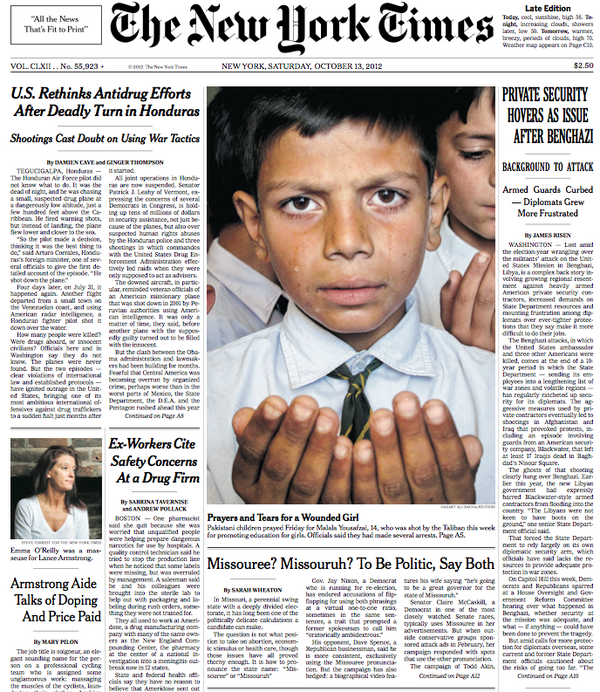No, just saying “I can use any words I want to” doesn’t deal with the problem. No, it really doesn’t. Not even if you say it really loudly, or over and over again, or really loudly over and over again.
Another day, another Internet radio show, another transcript, another attempt to make the problem just a matter of swearing.
…there is nothing that is placed outside of purpose, especially words, and what words I use depend on what message I am trying to convey. This is why I have such a problem with censorship. I would just as soon see Vincent Van Gogh censored as I would any artist, and the same goes for any wordsmith.
It’s one of the reasons I admired George Carlin so much. Do you remember his shtick back in the 1970’s, the one where he listed seven words that you would never, ever hear on television? Well, here we are, thirty years later, and you still won’t hear the words “shit, piss, fuck, cunt, cocksucker, motherfucker or tits” on NBC, CBS or ABC.
One, we need to define what kind of censorship we’re talking about. But more important, two, notice what words are not in Carlin’s list. Nigger, kike, faggot, spic, wop, yid, wetback, greaser, chink, slope, gook, Polack – you get the idea.
Except for “tits” the words were and are all swear-words. Three of them are also epithets. That seems to confuse people. Swearing is one thing and epithets are another. The problem I mentioned is not a problem about swearing, it’s a problem about epithets.
What saddens me is that there is a movement within the freethought community to censor words, just for the sake of their existence – giving no thought to context. There are words that have been deemed simply too offensive to even utter, and that, as a wordsmith, I have a huge problem with, because it reminds me of a certain religion that has a prophet that depicting an image of is too offensive to even draw.
No, that’s wrong. We utter them all the time. The problem is not uttering them, the problem is using them as epithets to revile and degrade certain women. The problem is using them as epithets to whip up hatred of certain women. The problem is using them in that context. It’s not true that we give no thought to context! It’s the opposite of the truth. A man furiously screaming that a particular woman is “a fucking bitch” is one context, and we do think about it.
Don’t even get me started on phrases like, ‘the n-word’ or whatever word people want to describe in similar fashion. If I mean to say something, I am going to use the word, not a rendition of the word. It reminds of the Christian who says, “Well, Sally is such a b.” For fuck’s sake, if you think Sally is a bitch, then just call Sally a bitch, and move on. We know what you mean, and using a letter in place of a word does NOT make you a better person.
And yet and yet and yet! Notice that he still doesn’t say – despite having set himself up to say exactly that – “For fuck’s sake, if you think Sally is a nigger, then just call Sally a nigger, and move on.” It’s still just bitch. Bitch is ok; bitch is fine; just say it, and move on. But what about “nigger”? Is that fine?
I haven’t seen him say it’s fine. I think the fact that he hasn’t said that indicates that he wouldn’t say that. Good. But then why does he say it when it’s about women as opposed to non-white people? And why, to be blunt, is he so obtuse about it?
I am a wordsmith. An architect. I will use whatever words I choose to build with, and it is your choice to drive by and bitch about how ugly the building is, or drive around town to find other things I’ve built. Either way, your choice. Just know, in any given room you’ll likely find an old record player, with a scratchy recording of a familiar voice, saying, “shit piss fuck cunt cocksucker motherfucker tits,” and sometimes even “fart, turd or twat.”
But not, I take it, nigger, kike, faggot, spic, wop, yid, wetback, greaser, chink, slope, gook, Polack. Why is that, Al (for it is he)?




(This is a syndicated post. Read the original at FreeThoughtBlogs.)




